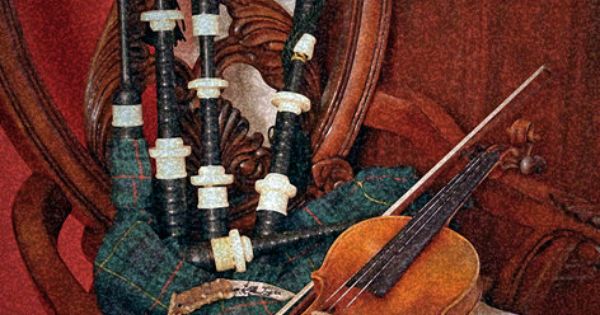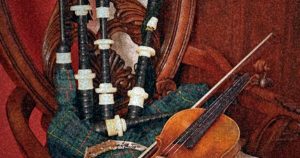Scotland, with its castles, the Scottish Highlands, and luxury golf holidays, has a rich musical history that is a distinct and individual as the country itself. The Gaelic language and poetry embedded into the traditional music of Scotland is among the most ancient, but is still spoken and sung today.
The folk music of Scotland is dominated by fiddles, accordians, and various pipes. Gaelic and Celtic traditions are kept alive in Scotland with folk music festivals held in various cities throughout the year.
The History of Traditional Scottish Music, Celtic Instruments, and Scottish Bagpipes
For centuries, Celtic bards were chiefly soloists. The idea of a Celtic “folk band” did not surface until the 1960’s and 70’s. Scottish folk music was not well known outside of Scotland until Charles II invaded England with a Scottish army in 1650. Charles II fled into exile after battling with Cromwell’s army, not returning to the throne until 1660. Jacobite poets, who supported King James VII of Scotland in the late 1600’s, wrote and sang many ballads about the historical events of the day, while Roman Catholics and Protestants battled over the throne of England.
Scotland’s folk music was influenced by the instruments used. The Celtic harp, fiddle and pipes are traditional, but if there is a national instrument of Scotland, it is the bagpipe. The bagpipe was first used as a military instrument. It was employed in marching, laments, and clan assembly. Under British influence, military pipe and drum bands were established, beginning in the 1600’s. The bagpipe tradition carries on to this day, although newer Scottish folk bands, such as the Whistlebinkies, are using bagpipes in innovative ways.
While Classical Music in Scotland is Slight, Scottish Bagpipes and Fiddle Music is Abundant
During the Protestant Reformation, secular music was generally frowned upon. Although Scottish folk music flourished in pubs and taverns, there were not many Scottish classical music composers, if any. Mendelssohn wrote his “Scottish Symphony,” and Beethoven used Scottish airs as inspiration for some of his works, but the strength of Scotland’s music lies within its folk traditions to this day.
Classical music appreciation students will hear some outstanding folk musicians among the Scots. Listen to the outstanding Bothy Band sing an a capella Gaelic song called “Fionnaghuala.” The Whistlebinkies use strictly traditional Celtic instruments, such as the Celtic harp and bagpipes. Music appreciation students are sure to enjoy their recording of “The Ladies’ Hornpipe.” Scotland’s answer to the Irish Chieftan’s has to be Boys of the Lough, with the amazing Shetland fiddler Aly Bain. Their recording of “La Grande Chaine Medley” is a clear example of traditional Scottish fiddle music. For a taste of authentic and exquisite bagpiping, listen to as many recordings of John D. Burgess as possible.























